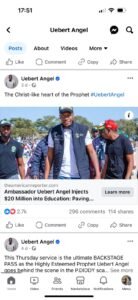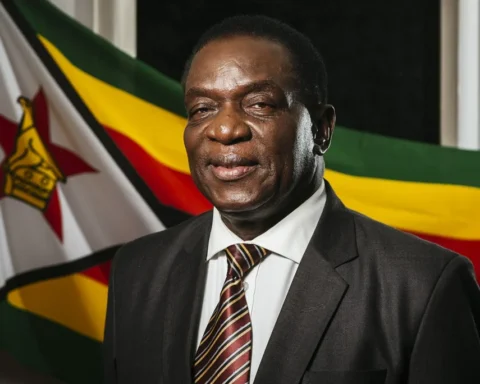Recent findings have unearthed a troubling scheme allegedly involving Uebert Angel, aimed at fabricating a philanthropic image for personal gain.
Feeling overshadowed by genuine philanthropists like Wicknell Chivayo, who lavishes Zimbabwean celebrities and citizens with cars, Angel purportedly resorted to concocting news and paying off fake news websites to spread false tales of his charitable deeds.
The scandal unfolded when an obscure website, dubbing itself “ the American Reporter,” broke the sensational story of Angel injecting a whopping $20 million into Zimbabwean education. Surprisingly, not a single credible news outlet in Zimbabwe touched the story, despite its incredulous claims. Adding to the intrigue, Angel himself shared the dubious link across his official social media platforms, raising suspicions about his involvement.

Under the headline “Ambassador Uebert Angel Injects $20 Million into Education: Paving The Way to 100,000 Sponsored Students,” the fake news website stirred skepticism and scrutiny from the public.
An investigation by Report Focus News uncovered alarming evidence suggesting a calculated ploy to deceive the public and enhance Angel’s image through deceit.
Uebert Angel who has relocated to Zimbabwe from England, has had a string of negative stories from the Gold Mafia scandal which raised the British authorities eyebrows to the turf wars he has been waging in Harare with the likes of Apostle Java and the extortion allegations he has had a lions share of bad publicity.
Our investigation unraveled a disturbing trend among fame-hungry pseudo-philanthropists such as Uebert Angel who resort to such underhanded tactics to build a false aura of benevolence. It revealed a network of fraudulent online platforms, including the Israel-based site Fiverr, where clients commission fake news articles for a pittance, aiming to boost their credibility and reputation.
This revelation brings to light the dark underbelly of fake news proliferation in today’s digital age, where fraudulent online platforms are exploited to disseminate misleading information for selfish motives. Why would Uebert Angel make such an obviously false and misleading claim? Has he become that brazen as to boldly lie? Does he think no one will fact check his claims? This is what happens when you get used to making false claims from a pulpit to gullible followers. Uebert Angel leads a church and just recently forayed into politics after being appointed as ambassador.
The implications of Angel’s alleged involvement extend far beyond mere reputation management, raising serious concerns about the integrity of public discourse and societal perceptions.
The scandal begs questions about ethical conduct, accountability, and responsibility in an era dominated by digital influence. As public figures wield immense power and influence, their actions should be subject to rigorous scrutiny and accountability.
In light of these revelations, urgent steps must be taken to combat the root causes of fake news proliferation and safeguard the integrity of information dissemination. This entails heightened awareness, enhanced fact-checking mechanisms, and greater accountability for those perpetuating misinformation.
The exposure of Uebert Angel’s alleged involvement in this fake news scheme serves as a stark reminder of the importance of upholding journalistic standards and fostering a culture of integrity and accountability in media and public discourse.







